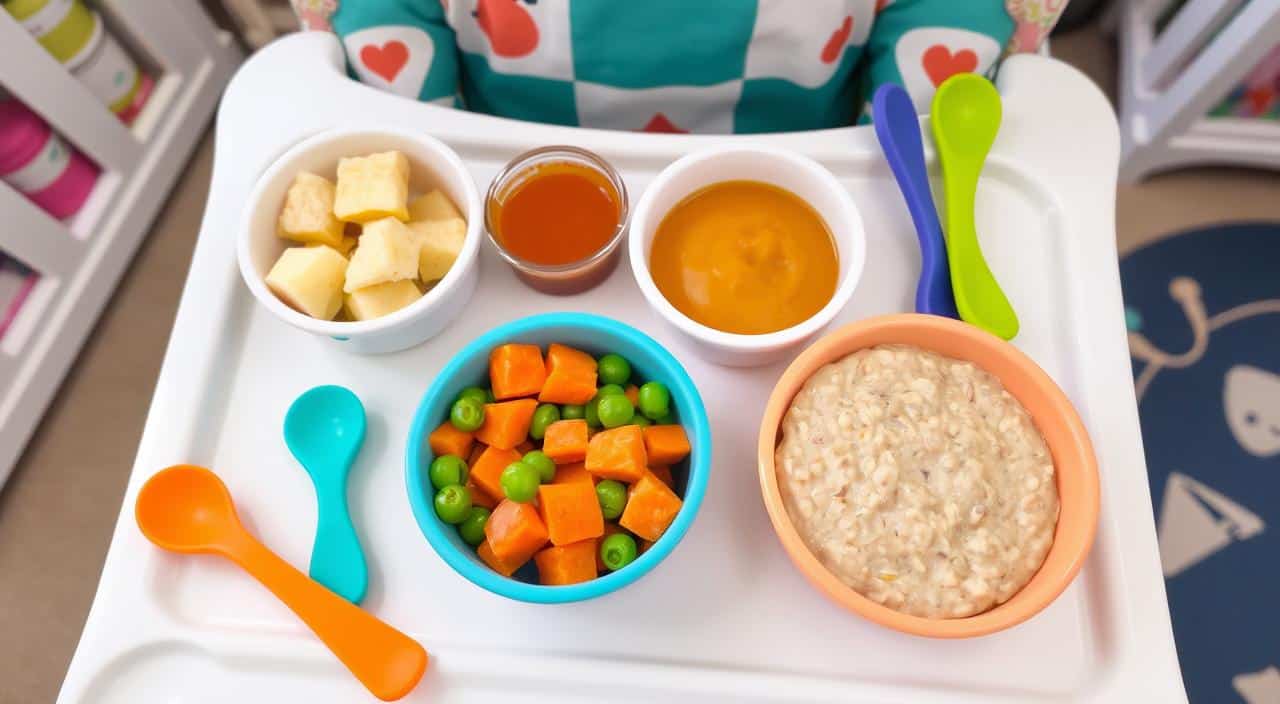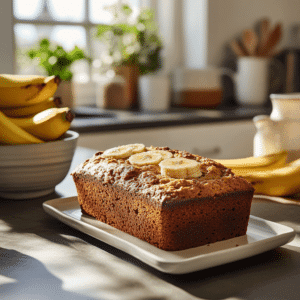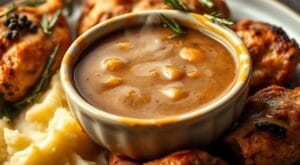Jump to:
Estimated reading time: 12 minutes
Table of contents
What 3 meals should a baby eat? Feeding a growing baby is a delicate task. Their nutritional needs and appetite change with each stage. It’s important to give them a well-rounded diet to support their growth and health. A balanced meal plan ensures your baby gets the nutrients they need.
Newborns usually eat every 2-3 hours, taking in 1-2 ounces of breast milk or formula. As they grow, the time between feedings gets longer, and they eat more at each sitting. It’s also key to introduce solid foods at the right time and in the right amounts.
What 3 meals should a baby eat? Key Takeaways
- Babies need a balanced diet with various nutrients for growth and development.
- The frequency and amount of feedings change as babies grow, from newborn to toddler.
- Introducing solid foods at the right time and in the right portions is crucial for your baby’s health.
- Following your baby’s hunger and fullness cues is more important than strictly sticking to a feeding schedule.
- Establishing a consistent mealtime routine can help your baby develop healthy eating habits.
What 3 meals should a baby eat? Introduction
Starting your baby on solid foods is exciting but can feel overwhelming. This guide offers a 3-meal plan for your baby, with age-appropriate breakfast, lunch, and dinner ideas. You’ll also learn about portion sizes, nutrients, and how to transition to a regular feeding schedule.
The American Academy of Pediatrics suggests breastfeeding or formula-feeding for the first 6 months. Around 4-6 months, most babies are ready for solid foods. This is a big step towards healthy eating habits for life.
When introducing solid foods, focus on a balanced and nutritious diet. This guide will help you understand baby feeding, infant meal plans, and baby nutrition with confidence.
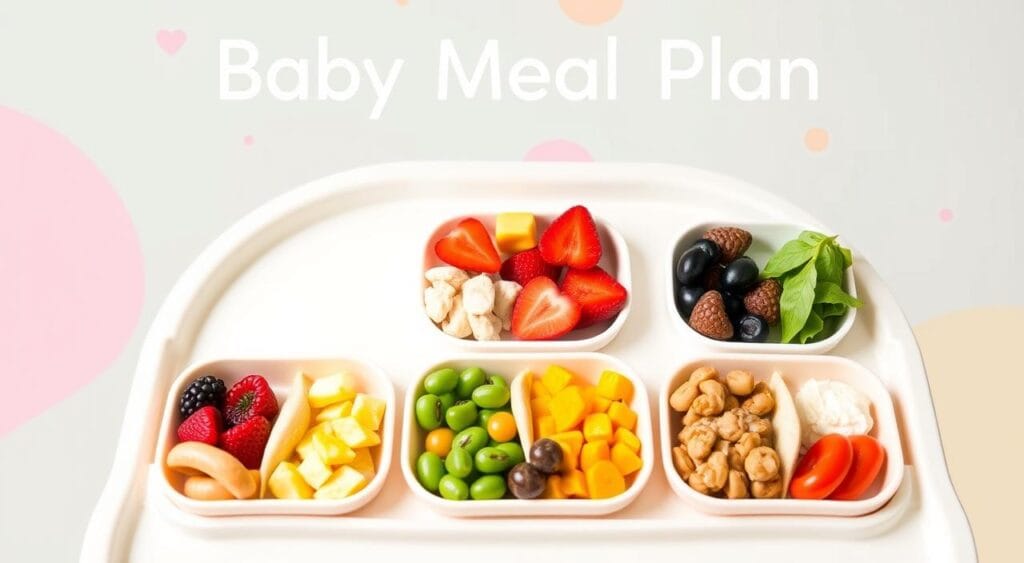
“The first years of a child’s life are crucial for establishing healthy eating habits that can last a lifetime.”
This article offers feeding schedule suggestions from breakfast to dinner. You’ll also get tips on adding important nutrients like protein, healthy fats, iron, and calcium. By following this baby feeding guide, you’ll ensure your baby gets the balanced meals they need to grow and thrive.
Why a Balanced Meal Plan is Important for Babies
It’s key to give your baby a balanced diet for their growth. A mix of foods rich in nutrients ensures they get proteins, fats, vitamins, and minerals. This helps their rapid growth. Also, introducing different tastes and textures early helps them develop good eating habits and avoid being picky.
Supporting Growth and Development
Babies grow fast in their first year. A diet full of essential nutrients supports this growth. For example, proteins help build and fix tissues, and healthy fats are good for the brain and energy.
Establishing Healthy Eating Habits
The foods you introduce early can shape your baby’s eating habits. By exposing babies to many flavors and textures, you encourage them to try new things. This can help them avoid being picky and develop healthy eating habits for life.
Introducing a Variety of Flavors and Textures
- Introduce your baby to many fruits, vegetables, grains, proteins, and healthy fats to help their taste buds grow.
- Give them different textures, from soft to chunky, to learn how to chew and swallow.
- Start with one new food at a time to help them get used to new tastes and avoid allergies.
“Exposing babies to a diverse diet supports the development of their taste buds and encourages them to be adventurous eaters.”
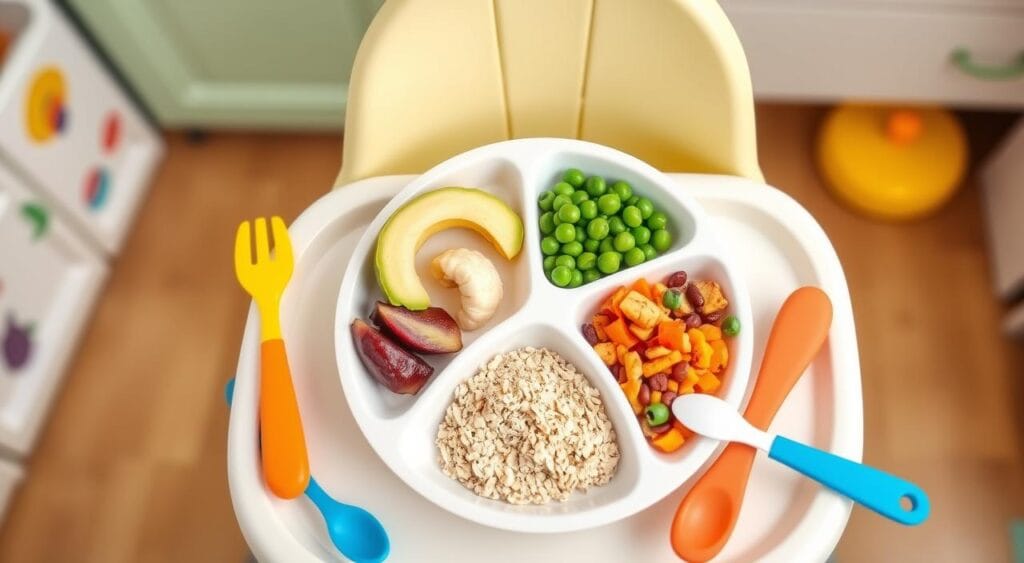
By giving your baby a balanced diet, you support their growth, help them develop good eating habits, and introduce them to many flavors and textures. These are all important for their health and well-being.
Breakfast Ideas for Babies: A Nutritious Start to the Day
Starting your baby’s day with a balanced breakfast is key for their growth. Here are some tasty, iron-rich breakfast ideas to begin their day well.
What 3 meals should a baby eat? Iron-Fortified Baby Cereal with Pureed Fruit
Iron-fortified baby cereal with pureed fruit is a great best baby breakfast food. Mix 5 to 8 tablespoons of cereal with 2 to 4 tablespoons of fruit like apples, pears, or bananas. This combo is packed with iron and other important nutrients.
What 3 meals should a baby eat? Scrambled Eggs with Mashed Avocado
Scrambled eggs with mashed avocado is a protein-packed breakfast ideal for iron-rich breakfast for babies. Cook 2 to 4 tablespoons of eggs and blend with 2 to 4 tablespoons of avocado. It’s a tasty, healthy meal.
What 3 meals should a baby eat? Yogurt with Banana and Oats
A bowl of yogurt with mashed banana and oats is a tasty first foods for breakfast. It introduces your baby to new flavors and textures. Serve 2 to 4 tablespoons of yogurt, 2 to 4 tablespoons of banana, and a bit of oats for a nutritious start.
Lunch Ideas for Babies: Light and Nutritious Midday Meals
Lunchtime is a great chance to introduce your baby to many tasty and healthy foods. Try mashed sweet potato with shredded chicken and spinach, or quinoa with steamed broccoli and cheese. These meals are balanced and will keep your baby full and happy.
Mashed Sweet Potato with Chicken and Spinach
This dish is full of flavor and nutrients. It has mashed sweet potato, chicken, and spinach. The soft texture is perfect for babies to try new foods.
Quinoa with Steamed Broccoli and Shredded Cheese
Quinoa is a healthy grain that makes a great base for lunch. Add steamed broccoli and shredded cheese for extra flavor and texture. It’s a meal your baby will love.
Lentil Soup with Soft Vegetables
For a filling lunch, try lentil soup with soft veggies. Lentils are a good source of protein, and the veggies add new tastes and textures. It’s a meal that will warm your baby’s heart and fill their belly.
Introducing new foods at lunch is a great way to broaden your baby’s taste. Offer a variety of soft, healthy foods. This ensures they get the nutrients they need to grow and develop.
What 3 meals should a baby eat? Dinner Ideas for Babies: Wholesome Meals to End the Day
Dinner is a great time to give your baby more filling and healthy meals. A balanced dinner helps them grow and learn to eat well. Here are some tasty and complete dinner ideas for your baby:
Ground Turkey with Peas and Carrots
Ground turkey is full of protein, making it a great choice for dinner. Adding peas and carrots makes it soft and easy for your baby to eat. This meal is packed with vitamins, minerals, and carbs, making it a nutritious baby dinner.
Baked Salmon with Soft-Cooked Green Beans
Baked salmon is a great way to introduce healthy fats and flavors to your baby. Pairing it with soft green beans makes for a balanced meal. Salmon and green beans together support your baby’s growth.
Brown Rice with Soft-Cooked Vegetables and Hummus
For a hearty dinner, try brown rice with soft veggies and hummus. This meal is full of soft and easy-to-eat dinner foods. It has complex carbs, vitamins, and minerals from the veggies, and healthy fats from the hummus. It’s a nutritious baby dinner your baby will love.
“Providing a balanced dinner is crucial for supporting your baby’s growth and development, as well as establishing healthy eating habits from an early age.”
What 3 meals should a baby eat? Balancing Meals with Nutrients Your Baby Needs
When planning your baby’s meals, it’s crucial to ensure they’re getting the essential nutrients to support their rapid growth and development. Adequate protein, healthy fats, iron, and calcium are all vital components for your little one’s wellbeing.
Including Protein for Growth and Development
Protein-rich foods, such as meat, eggs, and legumes, are essential building blocks for your baby’s tissues and muscles. Incorporating these nutrient-dense items into their meals can help fuel their growth and development.
Adding Healthy Fats for Brain Development
Healthy fats, like those found in avocados, nuts, and fatty fish, play a crucial role in your baby’s brain development. These beneficial lipids support cognitive function and overall neurological health.
Ensuring Iron and Calcium Intake for Strong Bones and Muscles
Maintaining sufficient iron and calcium levels is also crucial for your baby’s bone and muscle health. Fortified cereals, pureed meats, yogurt, and cheese are excellent sources of these essential minerals.
| Nutrient | Importance | Good Sources |
|---|---|---|
| Protein | Supports growth and development of tissues and muscles | Meat, eggs, legumes |
| Healthy Fats | Promotes brain development | Avocado, nuts, fatty fish |
| Iron | Builds strong bones and muscles | Fortified cereals, pureed meats |
| Calcium | Supports bone health | Yogurt, cheese |
“Ensuring your baby receives a balanced diet with the right essential nutrients is crucial for their optimal growth and development.”
By focusing on these key nutrients, you can create wholesome, nutritious meals that will help your little one thrive. Refer to our baby food recipes for more inspiration on how to incorporate these important elements into your child’s diet.
What 3 meals should a baby eat? How to Transition to Three Meals a Day for Babies
As your baby grows, it’s time to move from small, frequent feedings to three main meals a day. But how do you know when it’s the right time? Look for these signs that show your child is ready for regular meals:
- Improved head and neck control: Your baby should be able to sit up straight and hold their head up without help.
- Loss of the tongue-thrust reflex: This reflex, which makes babies push food out, usually goes away by 4-6 months.
- Interest in table foods: If your baby reaches for your plate and wants to try what you’re eating, they’re ready for solid foods.
When you see these signs, start a regular meal schedule. This helps your baby know when it’s time to eat. Even with solid foods, breast milk or formula should still be the main food until they’re one year old.
Balancing Solids with Breastfeeding or Formula
When you start three meals a day, keep a balance between solids and breast milk or formula. Give breast milk or formula before and after solid meals. This makes sure your baby gets all the nutrients they need for growth.
“The key is to follow your baby’s cues and introduce solids at a pace that works best for them.”
Every baby is unique, so be ready to adjust your feeding routine as needed. With patience and a bit of trial and error, you’ll find the perfect mix of solids and breastfeeding or formula for your baby’s happiness and health.
What 3 meals should a baby eat? Additional Snack Ideas for Babies Between Meals
Offering healthy snacks between meals can keep your baby satisfied and support their growth. You can give them sliced soft fruits and vegetables or whole-grain crackers with nut butter. These are great nutritious finger foods and age-appropriate snacks for your little one.
Sliced Soft Fruits and Vegetables
Bananas, pears, and cooked carrots are easy to grab and full of nutrients. They introduce your baby to different flavors and textures. These healthy baby snack ideas support your baby’s development between meals.
Whole-Grain Crackers with Nut Butter
Whole-grain crackers with a thin layer of nut butter are a good snack for older babies. They offer complex carbohydrates and healthy fats to keep your baby full. This between-meal option for babies adds extra nutrients to their diet.
Cottage Cheese or Soft Cheese Cubes
Cubes of cottage cheese or soft cheese offer new flavors and textures. They also provide protein to support your baby’s growth. These nutritious finger foods are easy to grasp and enjoy between meals.
By adding a variety of healthy baby snack ideas to your baby’s routine, you ensure they get a balanced diet. This supports their growth and development throughout the day.
Frequently Asked Questions: What 3 meals should a baby eat?
What are some healthy meal ideas for a baby?
Healthy meals for a baby include simple, nutritious options like mashed fruits or vegetables, pureed meats, and soft-cooked grains like oatmeal. These meals provide essential nutrients and are easy for babies to digest.
What are three meals a baby should eat each day?
A balanced day of meals for a baby could include oatmeal or rice cereal with fruit for breakfast, pureed vegetables with mashed protein (like chicken or beans) for lunch, and a soft, iron-rich grain with a vegetable or fruit puree for dinner.
When can a baby start eating three meals a day?
Babies can generally start eating three meals a day around 8-9 months, as they begin to rely less on milk and more on solid foods for nutrition. Be sure to introduce new foods gradually to monitor for allergies.
How can I make sure my baby’s meals are nutritious?
To ensure nutritious meals, focus on variety. Include iron-rich foods (like fortified cereals or beans), fruits, vegetables, and healthy fats from sources like avocado. This supports balanced growth and development.
Conclusion
Creating a balanced 3-meal plan for your baby is key to their growth and development. Offering a variety of nutrient-dense foods at breakfast, lunch, and dinner is essential. This ensures they get the proteins, fats, vitamins, and minerals needed for their rapid growth.
It’s important to listen to your baby’s hunger and fullness cues. Introduce new foods gradually. Always consult your pediatrician for personalized feeding advice.
Key takeaways for a balanced diet for infants include exclusive breastfeeding for the first six months. Start introducing solid foods around six months. By nine months, aim for three meals a day.
Good hygiene practices and watching for any adverse reactions to new foods are also vital. These steps help establish healthy eating habits early on.
By following these guidelines and making mealtime positive, you can foster a lifelong love for wholesome, nutritious foods. This summary emphasizes the need for a diverse, well-rounded feeding approach. It supports your baby’s physical, cognitive, and emotional development.
